In today's digital age, our sense of urgency and newsworthiness often lies in what's trending. It isn't worth national concern if it's not causing online conversation worth a spot on our social media feeds. This applies to almost every headline, leaving no disparity between natural disasters and what's happening in the entertainment industry. But on some occasions, one topic would trump all the others when it comes to buzz and level of importance — right now, it's the coronavirus outbreak.
#Coronavirus on Instagram
It's been a while since a contagion made nations wary to this level, with SARS and H1N1 being the most notable in the 2000s. Flights are being cancelled, face masks are being hoarded, and people are being quarantined, mimicking events from all-too-familiar scenes from fictional films.
But if there's one thing that we didn't expect from this scenario, it would be influencers allegedly exploiting this trending topic for social media fame. We're talking about both aspiring and established influencers on Instagram who are said to be using #coronavirus along with other hashtags like #followforfollow and #ootd as a means to gain more traction for their posts.
In perspective, these incidents can be considered minute in contrast to the 400,000 posts (and counting) filling the hashtag to date. But while most of these grids contain information about the outbreak, the influencer posts stand out like a sore thumb in its glossed-up glory, pegging protective masks as justification for such behaviour. Notably, influencers aren't the only one joining the train. Photographers, casual travellers, and random users on the platform also use the outbreak hashtag to share selfies, promote non-mask products, and just share travel photos.
Netizens find questionable how — in their opinion — a number of influencers are trying to pass it off their coronavirus-related posts as a genuine show of concern and support to raise awareness for the issue, all while squeezing in hashtags like #travelblogger and #travelgram between #coronavirus and #wuhancoronavirus. As expected, the internet has to say its two cents on the matter.
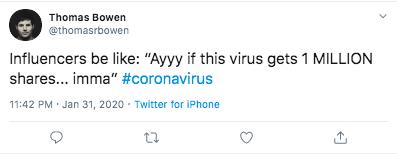
One netizen reacting to the issue (Source)
Calling out misinformation and distasteful bandwagoning
We all know by now that with the internet, nothing's black and white. While it seems like this trend is being welcomed on Instagram, some netizens took to Twitter to express their distaste. NBC News Editor Olivia Solon shared some of her favourites from the hashtag, giving snide reactions while quoting some of the captions of the posts she's gathered. She also implied in one of her Tweets that treating face masks as a fashion statement just to join the bandwagon, especially when it's not even the right one to use given the situation, is another way of spreading misinformation.
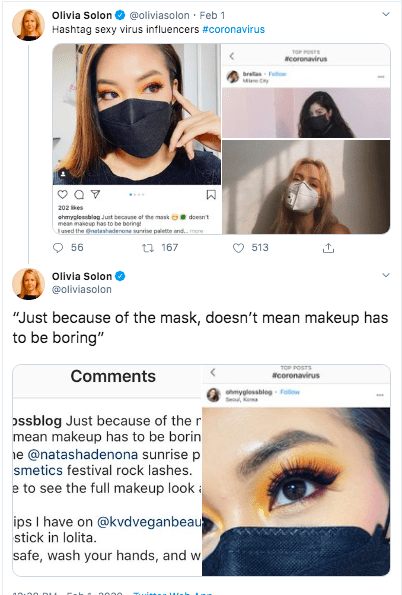
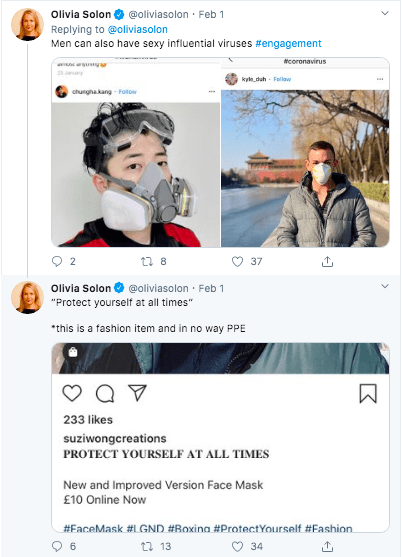
Some parts of Olivia Solon's long thread on Twitter
Another Twitter user also can't help but be at a loss for words (ironically, given it's a thought-sharing platform) when reacting to how these influencers are "cashing in" on the situation. One of his screenshots features Filipina influencer Adena Wilson, whose Instagram post has a call-to-action to head to her YouTube channel, after sharing news that masks are running out of stock within the metro.
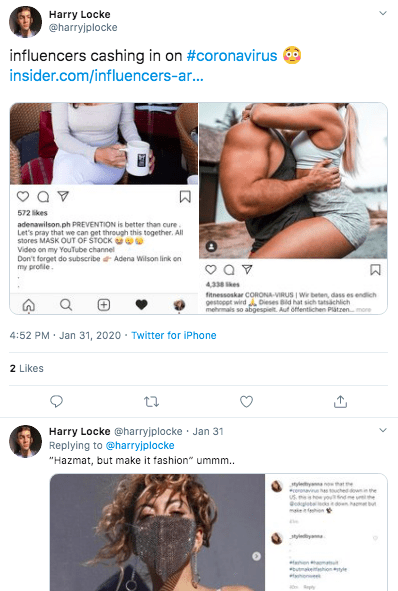
"Hazmat, but make it fashion." Yikes!
More and more netizens started to share their opinions on the situation, following the headlines that rooted from Olivia Solon's original tweet. One even wrote that these influencers use #coronavirus in a "desperate bid to go VIRAL".
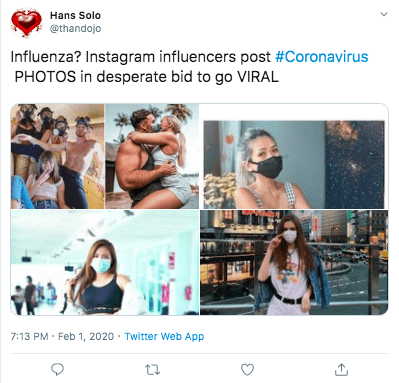
Netizen calls influencers 'influenza' as a reaction to the trend
There's always a flip side
With our current "call-out culture," influencers are usually the recipient of flak, as they've been at the centre of many controversies, like over-privileged content creation, talking about 'influencer representation', and of course, the many, many instances of drama. But there are also instances when they are immediately antagonised, mainly and just because they are influencers.
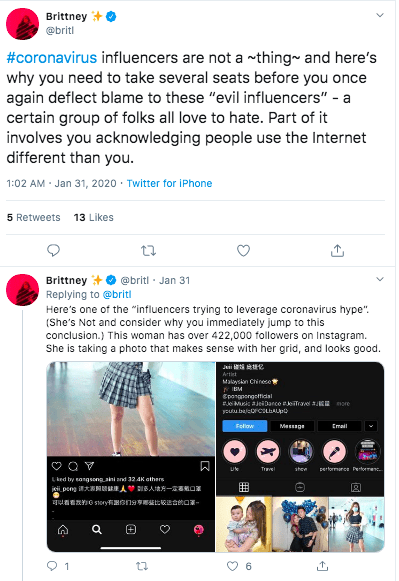
Twitter user @britl defends some influencers on the issue
One Twitter user felt the need point this out using Malaysian-Chinese influencer jeii_pong as an example. She mentioned that these critics didn't even bother reading Jeii's caption, where she's using her influence to remind her audience to stay safe given the situation. Vietnamese influencer Jada Hai Phong Nguyen was also dragged into the conundrum, despite taking the time to summarise the current outbreak situation in her Instagram post, as well as provided some measures on how to keep your health in check amidst the issue. With this, the netizen felt the need to express that while people are busy turning these influencers to villains, there are also ordinary people with "few 100 followers" jumping in on the trend, with memes, selfies, and fake news that also need to be called out.
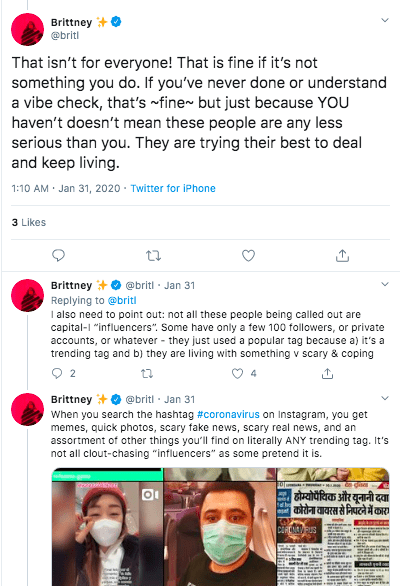
@britl also pointed out that even regular netizens are jumping in on the trend
Responsibility and accountability in the digital age
Seeing both ends of the situation, it is complicated to draw out a clear conclusion. For one, it is easy to judge influencers given their traction. People do it all the time with celebrities, and by right, these online personalities stand on a similar pedestal.
But on another level, it is also our responsibility to sift through information thoroughly. It is hypocritical to call their actions distasteful or irresponsible when all we do is generalise them into the "influencer cluster." This situation highlighted how people seem to treat influencers synonymously with negativity, that even those who mean well got dragged into the dirt.
With all this said, we can't help but raise a bigger question, within and outside the #coronavirus context: what has the internet really turned our society into? Coming up with an answer is no easy feat. But one thing's for sure. At the end of the day, whether you have a hundred followers or a hundred thousand, thinking before hitting that post button should always be a necessity, not just an option.
(Cover photo from: @sonyabuchik)
Comments, questions or feedback? Email us at [email protected].





.png)


